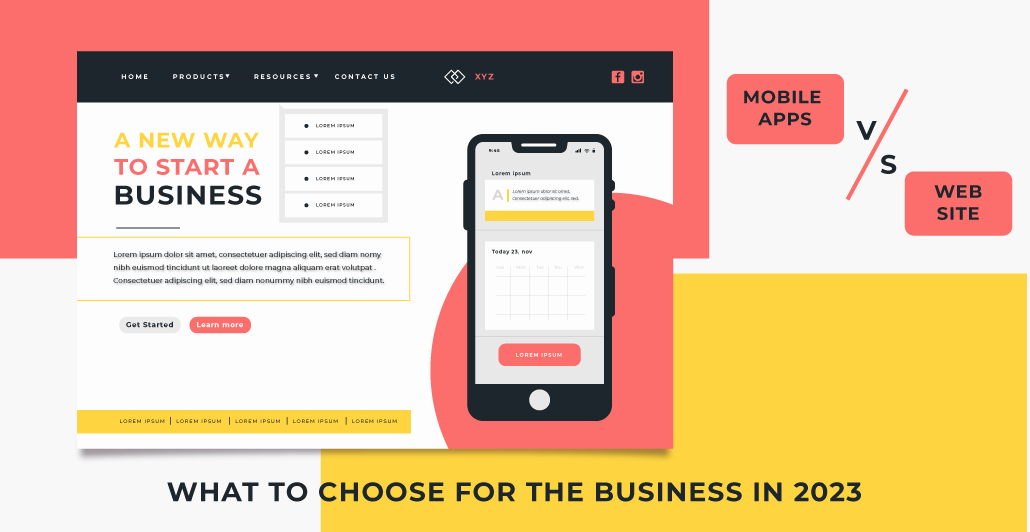Table of Contents
Mobile apps vs. Websites: Introduction
Mobile Website
Mobile websites have been tailored to be used on mobile devices like smartphones and tablets. Furthermore, Mobile websites are created using responsive web design techniques that adjust the website’s layout, font sizes, and images to fit smaller screens and touch-based navigation. Additionally, mobile devices have slower wireless internet connections than desktop computers. Therefore, mobile websites need to be fast-loading, easy to navigate, have a simple and clean layout, and provide quick access to information.Mobile app
Mobile apps are designed to provide specific functionality, such as social networking, gaming, messaging, or productivity. Additionally, it operates both online and offline. They are typically optimized for the smaller screens and touch-based input of mobile devices and may use the device’s hardware, such as GPS or camera, to enhance their functionality. Mobile apps are designed using native programming languages like Java or Swift or cross-platform development frameworks like React Native or Flutter.Mobile apps vs. Websites: Key Differences
A significant difference between mobile apps vs. websites is that the user requires a third-party application to access the website. In contrast, mobile apps are entirely platform-independent and do not require any third-party application installation. Users have to install the application on mobile phones to take benefit of its feature. Websites are hosted on the server and can be directly accessible from all devices. Also Read: WHY SHOULD YOU UPGRADE YOUR BUSINESS WEBSITE REGULARLY?Mobile apps vs. Websites: Advantages
Advantages of utilizing mobile apps
Here we emphasized a few advantages of using mobile apps:
- Convenience: Mobile apps are accessible anywhere and anytime, providing users with high convenience. Furthermore, users can complete tasks, browse content, or interact with others, all from the comfort of their mobile devices.
- Personalization: Mobile apps can be customized to fit the requirements of each user. Furthermore, users can set preferences, receive notifications, and receive personalized content based on their behaviour and activity.
- Efficiency: Mobile apps can streamline processes and make tasks more efficient. The software automates tasks and makes information easily accessible.
- Improved communication: Mobile apps can enhance communication between businesses and customers. Furthermore, it provides a more direct and efficient way to connect. Additionally, companies can improve customer service and support, and customers can receive updates and notifications quickly.
- Increased engagement: Mobile apps can increase user engagement by providing a more interactive user experience. Users give more time to the app and engage with the content.
- Access to real-time information: Mobile apps can provide real-time data, such as weather updates, news alerts, or stock prices. Furthermore, users are updated with the latest marking trend, which helps them to make more informed decisions.
Advantages of using a website
There are many advantages to using a website, including the following:- Accessibility: A website is accessible 24/7. Anyone can access it by sitting anywhere in the world. This allows businesses to reach a global audience and customers to access information and services conveniently.
- Cost-effective: Compared to traditional forms of advertising and marketing, a website is a relatively low-cost way to promote a business, sell products or services, and connect with customers.
- Increased credibility: Professional websites can make a business appear more credible and legitimate to potential clients. It can also help build trust with existing customers, as they can access information about the company, products or services, and contact details.
- Marketing opportunities: A website provides a platform for promoting a business’s products or services. Companies can drive more website traffic and enhance visibility using techniques such as search engine optimization (SEO).
- Customer engagement: A website can boost customer engagement and interaction and gather feedback, suggestions, and complaints. This improves their products or services and helps businesses to build good relationships.
- Flexibility and scalability: A website can be easily updated and adapted to meet the changing needs of a business, such as adding new products, changing pricing, or updating contact details. Additionally, a website can be scaled as the industry evolves.
- Data collection: A website provides valuable data about visitors, such as their demographics, interests, and behaviour. This data improves the website and the business’s marketing strategy.
Mobile apps vs. Websites: When to Use
When to use Mobile apps?
Here we highlighted a few examples of when to use mobile apps:- Productivity: Mobile apps can keep you organized and productive. You can use task management apps to create to-do lists, note-taking apps to jot down ideas, and calendar apps to schedule appointments and events.
- Communication: Mobile apps can help you stay connected with family, friends, and colleagues. You can use messaging apps to send text, images, and videos and video conferencing apps to have face-to-face conversations.
- Entertainment: Mobile apps can provide a wide range of entertainment options, from gaming to streaming apps that let you watch movies and TV shows.
- Travel: Mobile apps can be helpful when you’re travelling. You can use map and navigation apps to find your way around, translation apps to communicate with locals, and travel booking apps to plan and book your trip.
- Shopping: Mobile apps can make shopping more accessible and more convenient. You can use e-commerce apps to browse and buy products and coupon and deal apps to save money.
When to use websites?
Here, we highlighted a few examples:- Sharing information: If you have information that you want to share with others, creating a website can be a great way to do it. This can include educational material, news updates, or personal stories.
- E-commerce: If you want to sell your product, an e-commerce website can effectively reach customers and process transactions. Online stores allow you to make sales at any time.
- Marketing: Websites can be crucial to a business’s marketing strategy. They can be used to promote products or services, share testimonials or case studies, and generate leads through forms or calls to action.
- Communication: Websites can be used to facilitate communication between people or organizations. This can include blogs, forums, or social networks where users can share their ideas and unite with others.
- Branding: A website can be used to build and reinforce your brand identity. This can include showcasing your values, telling your company’s story, or displaying your products and services.

